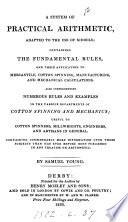 | 1831 - 210 pages
...called the extremes. Note. — In any series of numbers in Arithmetical progression, the sum of the two extremes is equal to the sum of any two terms equally distant from them; as in i! the latter of the above series 6+1=4+3, and =5+2. i When the number of terms is odd,... | |
 | John Radford Young - 1832 - 408 pages
...26 = a + c. THEOREM 3. In any series of quantities in arithmetical progression, the sum of the two extremes is equal to the sum of any two terms equally distant from the extremes 5 or it is equal to twice the middle term, when the number of terms is odd. For let a be the first... | |
 | Samuel YOUNG (of Manchester.) - 1833 - 272 pages
...of terms, and the sum of the series ; having any three given, the other two may be found. Theorem. The sum of the extremes is equal to the sum of any two means equally distant from them. PROBLEM I. Given the extremes and number of terms to find the other... | |
 | Silas Totten - 1836 - 320 pages
...of arithmetical progressions, without demonstrations.* (61.) 1st. In every arithmetical progression, the sum of the extremes is equal to the sum of any two terms equally distant from them ; or, equal to double the middle term, when there is an odd number of terms. Thus, in the progression,... | |
 | George Willson - 1836 - 202 pages
...difference. The numbers themselves are called terms, and the first and last terms extremes. PROPOSITION I. The sum of the extremes is equal to the sum of any two terms equidistant from them. Thus, in the series 2, 4, 6, 8, 10; 2+10=12, and 4 + 8=12. The reason is, that... | |
 | 1836 - 488 pages
...descending series, the first term is the greatest, and the last term the least. In arithmetical progression, the sum of the extremes, is equal to the sum of any other two terms equally distant from the extremes. The sum of the terms is equal to half the sum of... | |
 | James Bryce - 1837 - 322 pages
...the last term would be a — (я — 1)<¿ 170. Cor. In an equidifferent series, the sum of the two extremes is equal to the sum of any two terms equally distant from them« or to twice the middle term, if the number of terms be odd: for, in the above series, if we... | |
 | George Willson - 1838 - 194 pages
...difference. The numbers themselves are called terms, and the first and last terms extremes. PROPOSITION I. The sum of the extremes is equal to the sum of any two terms equidistant from them. Thus, in the series 2, 4, 6, 8, 10; 2+10=12, and 4 + 8=12. The reason is, that... | |
 | John Radford Young - 1839 - 332 pages
...26 = a + c. THEOREM 3. In any series of quantities in arithmetical progression, the sum of the two extremes is equal to the sum of any two terms equally distant from the extremes ; or it is equal to twice the middle term, when the number of terms is odd. For let a be the first term... | |
 | 1843 - 142 pages
...number of terms, and sum of the series ; having any three given, the other two may be found. THEOREM. The sum of the extremes is equal to the sum of any two meansequally distant from them. PROBLEM I. Given the extremes and number of term?, to find the other... | |
| |